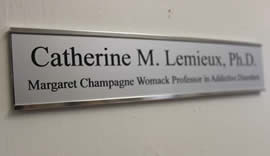$854,156 grant awarded to Lemieux, Social Work Professor, to address substance use issues in Louisiana

Rates of alcohol dependence, binge drinking, and substance use disorders among Louisiana residents are roughly comparable to national rates, according to the National Survey on Drug Use and Health, yet most Louisiana residents struggling with alcohol and substance use disorders remain untreated. This is partly due to a scarcity of specialty treatment resources, but also because there is a shortage of healthcare workers who are specifically trained to identify and intervene with patients who have alcohol and substance abuse problems.
Dr. Catherine Lemieux, LSU Social Work’s Margaret Champagne Womack Professor in Addictive Disorders, has been awarded a $854,156 grant from the U.S. Department of Health and Human Services, Substance Abuse and Mental Health Services Administration (SAMHSA) to develop and implement a training program that teaches students in the health professions the skills necessary to provide screening, brief intervention, and referral to substance abuse treatment (SBIRT).
By expanding the availability of the evidence-based SBIRT curriculum in academic institutions, the number of healthcare professionals who can address the needs of persons at risk for substance use disorders will increase, thus reducing the impact of substance abuse and mental illness in Louisiana, ultimately benefitting the general population.
“Any project designed to strengthen the healthcare workforce will ultimately benefit the recipients of healthcare services,” said Lemieux. “Most healthcare professionals would agree that alcohol and substance use disorders are a major public health issue in Louisiana. However, the vast majority of individuals who need substance abuse treatment do not get it."

Research shows that health professionals using SBIRT are able to successfully identify at-risk patients, thereby preventing alcohol and substance use disorders from worsening.
The LA SBIRT Student Training Program specifically targets social work students, medical residents, and their supervisors. Grant funds will be used to recruit and train SBIRT teaching faculty in a two-day Train-The-Trainer session at no cost. The trained teaching faculty will then provide the SBIRT training to the students and to the supervisors in the students’ field and residency placements.
Over the course of the three-year funding period, Lemieux expects to train social work and medical students and their supervisors in at least 25 medical and health-related practicum sites each year around the state. In addition, grant funds will be used to make the SBIRT training curriculum available statewide to primary care and behavioral health frontline professionals across disciplines via continuing education and online programs at no cost.
About SBIRT
According to Lemieux, SBIRT is a patient-centered approach that incorporates the use of simple screening tools and techniques that are demonstrated to result in persons changing their behavior around alcohol and substance use.
About SSW
The LSU School of Social Work (SSW) aspires to be a leading graduate school of social work, a vibrant center of intellectual development, a leader in promoting and supporting diverse communities, and an advocate for an integrated and inclusive model of social work, all within a learning environment that supports best educational practices. The Child and Family Studies (CFS) undergraduate degree integrates theory, research, and practice to focus on child development and family dynamics.
About CHSE
The College of Human Sciences & Education (CHSE) is a nationally accredited division of Louisiana State University. Formed in 2012, CHSE brings together programs and capitalizes on individual strengths to create a dynamic new college that addresses the socially significant issues we face as a state and nation. The College is comprised of the School of Education, the School of Leadership and Human Resource Development, the School of Kinesiology, the School of Library and Information Science, the School of Social Work, and the University Laboratory School. These combined schools offer 8 undergraduate degree programs and 18 graduate programs, enrolling more than 1,900 undergraduate and 977 graduate students. The College is committed to achieving the highest standards in teaching, research, and service and is continually working to improve its programs.
